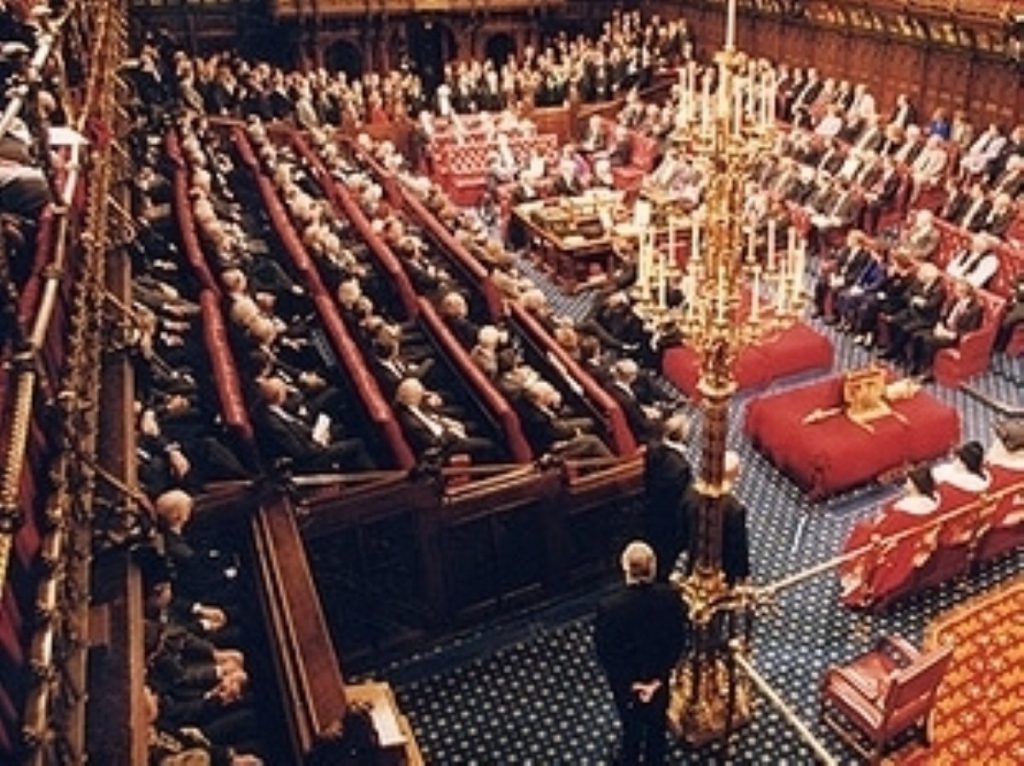Analysis: Why critics oppose a wholly-elected House of Lords
Nick Clegg has adopted a pragmatic approach to Lords reform, but he is faced with enemies on all sides.
By Ian Dunt
If Nick Clegg succeeds with his plans for Lords reforms – and 100 years of evidence suggests he won’t – students will be unimpressed to learn that he delivered the draft bill to a half-empty Commons filled with people laughing at him.
The deputy prime minister’s hopes of securing a cross-party agreement on the issue rapidly disintegrated this afternoon when shadow justice secretary Sadiq Khan told him Labour would only support a 100% elected second chamber. Clegg’s plan only allowed for 80%, although he put a 100% option in a white paper beside the draft bill, just to show how open and flexible the government was being.


That pragmatism was on display in every aspect of Clegg’s approach, not least from the fact that he has not gone with his own preferred 100% option. There are a variety of reasons why people oppose the idea of a fully elected second chamber and Clegg appears to have taken many of them on board.
Firstly, having a fully elected Lords, especially under the proposed single transferable vote (STV) system, challenges the democratic legitimacy of the Commons. When the two Houses clash, the Lords only have three chances to send a bill back before the Commons can overrule them, because it is the main chamber which holds the democratic legitimacy. If the Lords were fully elected, this would be a more difficult argument to make, especially when, as Tory MP Julian Lewis mischievously pointed out, Clegg actually believes STV is superior to the first-past-the-post system used in the Commons. Clegg’s response has been to propose just 80% elected members and reduce the size of the chamber from 750 seats to 300.
When Jack Straw drew up a white paper on Lords reform in 2008 he decided on an 80% elected level because of representation. Having an independent Lords appointment commission select 20% of the Lords allows it to reflects the ethnic and gender balance of the UK. It also ensures the continued presence of experts in the chamber to help with its scrutiny duties and makes sure the whole place isn’t just stuffed with party political figures.
Clegg seems to have taken these arguments on board and accepted that the second chamber should have a non-elected minority. But doing so seems to have cost him support from Labour. If he hadn’t, he would have probably lost support from the Tory backbenches, which is lukewarm at best. The deputy prime minister has little room to breathe and enemies on all sides.
Clegg has lost so much capital on his failed bid to introduce AV that his enemies now attack with a diligence that they previously lacked. Backbench Conservative and Labour MPs feel vindicated in their belief that the public is uninterested in constitutional issues, especially during the current economic malaise. Even though Labour ostensibly supports Lords reform, it’s not in its interests for it to succeed, because it wants to attract Lib Dem voters by showing that the party has failed to achieve its goals in parliament.
Furthermore, there are fundamental problems which the draft bill does not address. Clegg has posited that peers should be elected for a fixed term of three parliaments. That 15-year limit is designed to prevent career politicians aiming for the second chamber. Career politicians can be bribed and cajoled by whips. With nothing to offer or threaten them with, they are more likely to vote with their conscience. But there is a potential problem: having such a lengthy term offers the worrying combination of legitimacy and lack of accountability. Lords members (whatever they come to be called) will be keen to highlight their mandate but the electorate will be unable to get rid of them for 15 years. That seems contradictory and problematic.
No-one has a satisfying answer. Constitutional reform is usually a battle of two competing goods, or bads, depending on your viewpoint. It’s this quality that makes Lords reform so divisive in parliament and within political parties as well. As Clegg said, it’s an art not a science.
This time it’s different, for reasons which might, unfortunately, cancel each other out. The first is that Clegg will be desperate to secure Lords reform for his political survival – a factor which has not been true for the men leading previous efforts. On the other hand, Lords reform’s newfound political importance means Clegg might be less likely to find that longed-for cross-party agreement than he would have been in other circumstances.
If he manages to achieve consensus in the Commons, he still has a battle with the Lords to come. Of course, Clegg can overrule peers’ objections using the 1911 Act – something he refused to commit to today. But that sort of combative mood would be met with alarm in Downing Street.
There are a lot of variables in play and day-to-day party political advantage will have as big a role as constitutional theories. Lords reform still seems very far away indeed.

